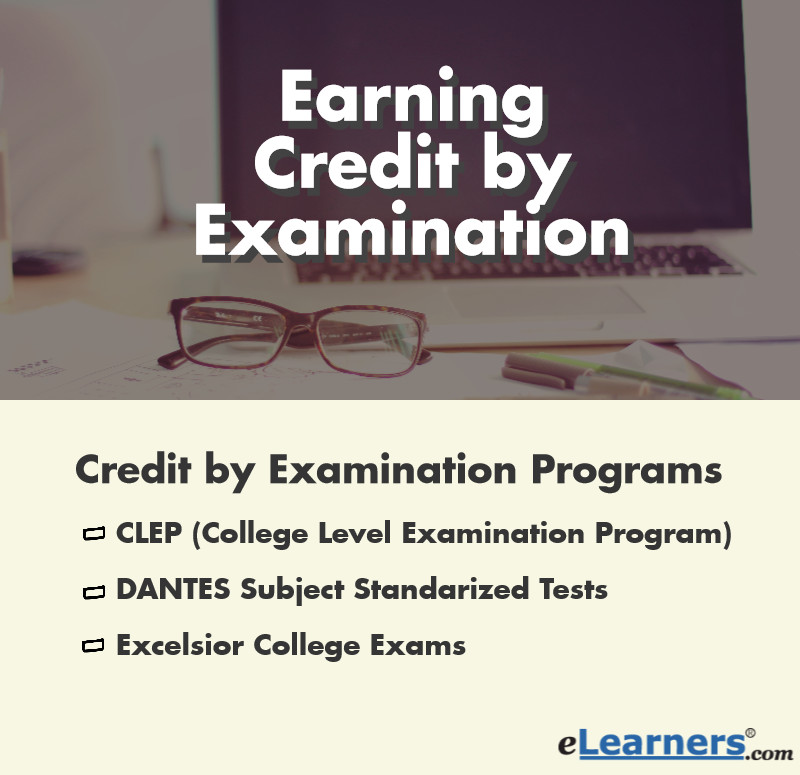 When you're learning new material, college courses can be exciting, even fun. But when you have a list of required courses to complete your degree and some of them cover knowledge you've already learned on the job, from reading in your spare time, or even remember from high school, then it can be frustrating to have to cover the same ground, especially when paying for the privilege.
When you're learning new material, college courses can be exciting, even fun. But when you have a list of required courses to complete your degree and some of them cover knowledge you've already learned on the job, from reading in your spare time, or even remember from high school, then it can be frustrating to have to cover the same ground, especially when paying for the privilege.
That's why credit by examination is a good choice for many students. There are a number of different programs that allow a student who already has a strong command of a particular subject to demonstrate that knowledge passing a standardized test in it, and treat that credit like transfer credit.
It's not entirely seamless, of course. While credit by examination can be an excellent shortcut, not every school accepts it, those that do often place a limit on how much credit can be earned in this way, and students who want to take advantage of it need to remain aware of possible overlap between the examinations that interest them and the coursework they may have taken or expect to take in the future.
Credit by Examination Programs
There are a surprising number of credit by examination programs. Some of the more popular are listed here:
College Level Examination Program.
CLEP is perhaps the best known and most widely accepted of the credit by examination programs. Administered by the College Board, the same people who run the SAT and other scholastic tests, CLEP tests can be taken at nearly 1,400 testing centers, including convenient locations like community colleges, and are accepted as the equivalent of transfer credit by nearly three thousand colleges and universities. There are 33 different CLEP tests in a variety of different subjects, most range from three to six lower division credits, but the three foreign language CLEP tests can be worth up to twelve credits each for a sufficiently high score.
DANTES Subject Standardized Tests.
DSST exams were originally developed by the U.S. military to help active duty personnel get credit for what they already knew, but since then it has also been made available to civilians. With two thousand colleges and universities offering credit for DSST exams, it is almost as widely accepted as CLEP, and unlike CLEP some of its tests offer upper division credit.
Excelsior College Examinations.
The ECE program is overseen by Excelsior College in Albany, New York. It differs from CLEP and DSST in a number of ways. Rather than be made available through testing centers at colleges and universities, students schedule to take ECEs at Pearson VUE Testing Centers. There are many more upper division ECEs than there are DSST exams. There are ECEs that cover a great deal of Nursing, a field not offered for credit by examination elsewhere. On the other hand, ECEs are accepted by fewer other schools, and they are more expensive than CLEP or DSST -- although still much less expensive than taking the equivalent college course!
Thomas Edison State College Examination Program.
This program, usually called TECEP, is overseen by Thomas Edison State College in New Jersey. It is similar to Excelsior College Exams, except that it offers different examination subjects. It is among the most expensive of the credit by examination programs, although like ECE it is still far more reasonable than a typical college course. It is also accepted by fewer institutions. TECEP is usually recommended primarily to those who attend a college that liberally accepts credit by examination when they have upper division credits to fill that cannot easily be met in another way. More information about TECEP is available on their web site.
Foreign Language Achievement Testing Service.
FLATS is a service of Brigham Young University in Utah. It offers correspondence based tests of a student's written ability in a particular language, with up to twelve credits offered for a successful score. FLATS is not as widely accepted as CLEP. However, while CLEP only offers French, German, and Spanish, FLATS offers a staggering fifty-eight different languages, ranging from Afrikaans to Welsh. The fee for FLATS is also very low at $50. More information about FLATS is available on their web site.
Comparison of Credit-by-Examination Programs
Remember that while credit by examination can be a great savings of time, not all colleges and universities accept it. If you have not yet enrolled in a school but intend to do so and to use credit by examination, make sure you speak in detail with prospective schools to ensure you won't be disappointed. And if you're already enrolled in a school, consult your academic advisor or counselor to make sure that any tests you do take will apply to your degree program. Good luck, and happy test taking!
